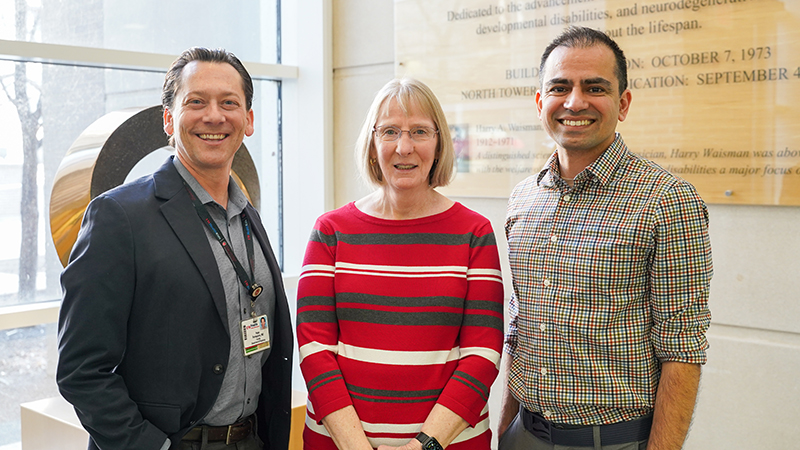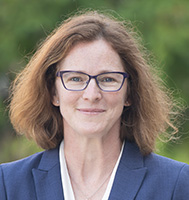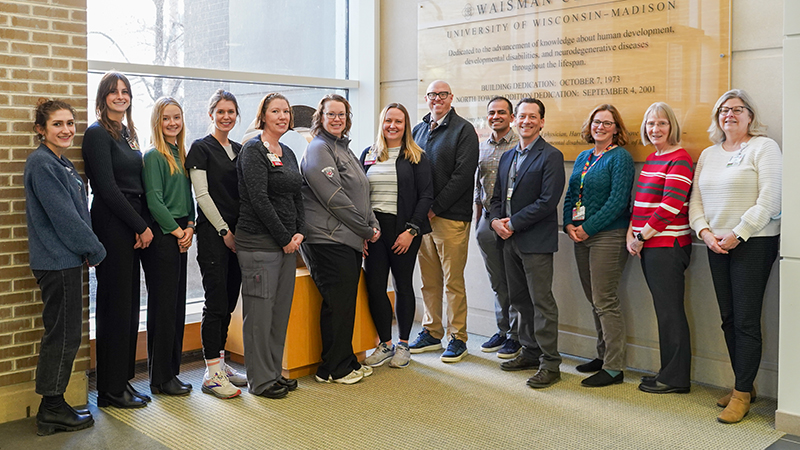
Photo by Kate Feldt/Department of Pediatrics
Every Thursday afternoon, the Pediatric Brain Care Clinic is open in the Waisman Center to see pediatric patients with acquired brain injuries, many recently discharged from time spent in the American Family Children’s Hospital (AFCH). The reasons for these children’s and young adults’ brain injuries include trauma, results of disease, cognitive effects of congenital heart disease (or their potential effects), and many other causes. Unlike most pediatric patients of the Waisman Center, these patients’ brain injuries are acquired, which means that, for most, the patients’ lives changed abruptly.
The clinic is directed by Peter Ferrazzano, MD, professor and chief of the Division of Critical Care, who operates it along with Division of Critical Care members Neil Munjal, MD, MS, assistant professor, and Lynne Sears, NP. Sears also serves as an advanced practice provider (APP) leader in the Department of Pediatrics.
Sears, Ferrazzano, and pediatric neuropsychologist Alanna Kessler-Jones, PsyD, officially co-founded the clinic in 2011. Before that time, Sears had been hired in 2000 to develop a Level 1 pediatric trauma program. She would often get calls from pediatric patients who had suffered non-operative head injuries, had been treated, and gone home, but were subsequently suffering from headaches and having difficulty in school.
“They were slipping through the cracks regarding their symptom management,” Sears explained. She would schedule ad hoc clinics and collaborate with any available neurologists and especially with psycho-social practitioners who could address the physical and often distressing psychological difficulties these patients were experiencing. “Some kids were experiencing full-blown depression and anxiety,” Sears said. “We dealt with that kind of symptom management.”
When Sears was about to move into a position in the Pediatric Intensive Care Unit (PICU), Ferrazzano, who was overseeing the change, asked her to bring her clinic along with her. The Pediatric Brain Care Clinic was officially established in the Waisman Center and very quickly “blossomed,” as Sears described it.
Today, the clinic’s diverse staff is an excellent multidisciplinary team, working to comprehensively evaluate six patients each week. Staff members include pediatric neuropsychologists Kessler-Jones and Jonathan Mietchen, PhD, and neuropsychology fellow Katherine Paltell, PhD. Karen Carpenter, MS, CRC, LPC, is a vocational rehabilitation specialist and school liaison, while Nicole Currey serves as a pediatric physical therapist. In addition, there are four psychometrists: Gabby Chinman, Lianna Yakubov, Jenna Fawcett, and Natalie Naze. Amy Beutel is the clinic’s medical assistant.
Ferrazzano is a specialist in acquired brain injury; his research work, which includes MRI studies of traumatic brain injury (TBI), began during his fellowship in pediatric critical care at Columbia University in New York City, and has continued with NIH-funded clinical and pre-clinical studies. “My research uses neuroimaging to understand developmental differences in the brain’s response to injury, and to identify new ways to evaluate and treat acquired brain injuries,” Ferrazzano said. “This synergizes with my work in the PICU and in the brain care clinic. We see kids of any age with brain injuries from causes including trauma, stroke, or severe infection.”
Ferrazzano added that because it is known that certain illnesses are associated with a subsequent risk for neurodevelopmental impairment, the clinic provides follow-up evaluations for those children. The largest group is children with congenital heart disease.
He noted that for several years the clinic has specifically been providing the neurodevelopmental evaluations of children with congenital heart disease who required a surgical repair during their first year of life. There are many potential sources of brain injury in infants undergoing heart surgery. Ferrazzano explained: “Most commonly in that population there is no specific, identifiable injury, such as a stroke or a cardiac arrest. However, we know that even when everything goes well with the surgery and recovery, those kids remain at risk for neurodevelopmental delays down the road.”
Those impairments may only reveal themselves many years later as the child enters different developmental stages, each with unique cognitive, psychological, and emotional demands. This phenomenon has highlighted the need for regular periodic follow-ups at specific developmental points as the child matures.

Jesse Boyett Anderson, MD, MS, assistant professor in the Division of Cardiology, joined the clinic this year. She is an expert in the neurodevelopmental effects of congenital and pediatric heart disease. She is leading efforts to optimize neurodevelopmental resources across the congenital heart program.
“I’m trying to spread awareness of this clinic and our work to improve the development and mental health outcomes of kids with congenital heart disease,” Boyett Anderson said. “I want more clinicians and parents to know about it and its benefits for patients.” Because of the clinic’s ability to address the needs of the pediatric cardiac population, its patient base comes from all over the state.
Munjal is both a neurologist and an intensivist — a physician who provides care for critically ill patients within the PICU. Intensivists take a comprehensive approach to their patients, rather than focusing on a particular body system. In the Pediatric Brain Care Clinic, Munjal and Sears work together to see patients after they have been tested by the neuropsychologist, seen the physical therapist, and have met the school liaison. They provide a wrap-up visit at the end. Munjal provides evaluations of acquired brain injury patients discharged from the PICU, while Sears sees the cardiac patients and the non-PICU concussions. “We follow the cardiac population as a kind of preventative measure, following up serially to the age of five,” Munjal explained. “The traumatic brain injury population we see reactively — they have had their injury and we are trying to reintegrate them back into life.”
Sears reported that the aftereffects of a concussion can have a “ripple effect” on the lives of the young patients. Headaches and dizziness can affect school focus, which can lead to depression, isolation, and worse. Kids need to know that it is a real physical effect of their injury — not just in their imagination — and that it can be treated.
Munjal noted that one thing that he loves about the brain care clinic is the connection it gives him to his patients in the PICU. The clinicians in the PICU don’t usually get feedback that shows how much what they do in the PICU matters. “Seeing the recovery that some of these kids make, weeks to months to years later after having suffered a horrific injury, is really quite impactful.” Munjal explained. “It provides a lot of meaning to me for my work. That connection of what we do in the hospital and how it affects outcomes is a very powerful one.” This connection has become a part of his own research in machine learning to create predictive models for PICU patients that may lead to better outcomes.

Photo by Kate Feldt/Department of Pediatrics